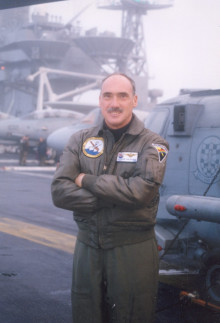from Rotor Review Winter 2024 #163
by Naval Helicopter Association, Inc
By CAPT George Galdorisi, USN (Ret.)
It is hard to believe that Harry Reasoner’s quote about helicopter pilots being different is over a half-century old. Most of you reading this weren’t around when he famously offered his opinion on February 16, 1971. That’s okay, you may have seen the framed quote on a wall in your squadron spaces or just heard it somewhere as part of the tribal knowledge of being part of our community. Here it is:
“The thing is, helicopters are different from planes. An airplane by its very nature wants to fly and, if not interfered with too strongly by unusual events or by a deliberately incompetent pilot, it will fly. A helicopter does not want to fly. It is maintained in the air by a variety of forces and controls working in opposition to each other and, if there is any disturbance in this delicate balance, the helicopter stops flying; immediately and disastrously. There is no such thing as a gliding helicopter.”
“This is why being a helicopter pilot is so different from being an airplane pilot, and why in generality, airplane pilots are open, clear-eyed, buoyant extroverts, and helicopter pilots are brooding introspective anticipators of trouble. They know if something bad has not happened, it is about to.”
That was then and this is now. If Harry Reasoner was alive today, he likely would never have said this. Why? Our aircraft are routinely the most reliable and mission capable in all of Naval Aviation. This is due, in no small measure, to the dedicated and tireless work of the men and women who maintain our (now-aging) aircraft and make them ready for flight.
During my first squadron tour, one of my fellow first-tour aviators was complaining about how some of the Sailors under his charge were having this or that issue and that it was taking up a lot of his time. Our skipper called him in for a chat. He asked the young lieutenant if he loved flying. The answer was “yes.” “Well then,” our CO said, “these men (all men then, this was the early 1970s) come to work every day and do what they likely don’t love doing so you can do what you do love doing.
Our maintainers are likely challenged more today than ever before. Except for our Osprey fleet (which has its own maintenance challenges) our aircraft are aging. Parts shortages, engendered by budget issues such as continuing resolutions, mean more work for the professionals who ensure the safety of our aircraft. We owe them our thanks.


